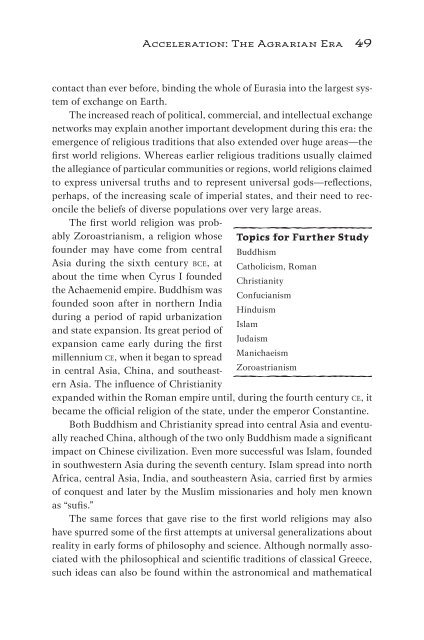This Fleeting World
This Fleeting World
This Fleeting World
You also want an ePaper? Increase the reach of your titles
YUMPU automatically turns print PDFs into web optimized ePapers that Google loves.
Acceleration: The Agrarian Era 49<br />
contact than ever before, binding the whole of Eurasia into the largest system<br />
of exchange on Earth.<br />
The increased reach of political, commercial, and intellectual exchange<br />
networks may explain another important development during this era: the<br />
emergence of religious traditions that also extended over huge areas—the<br />
first world religions. Whereas earlier religious traditions usually claimed<br />
the allegiance of particular communities or regions, world religions claimed<br />
to express universal truths and to represent universal gods—reflections,<br />
perhaps, of the increasing scale of imperial states, and their need to reconcile<br />
the beliefs of diverse populations over very large areas.<br />
The first world religion was probably<br />
Zoroastrianism, a religion whose Topics for Further Study<br />
founder may have come from central Buddhism<br />
Asia during the sixth century bce, at Catholicism, Roman<br />
about the time when Cyrus I founded<br />
Christianity<br />
the Achaemenid empire. Buddhism was<br />
Confucianism<br />
founded soon after in northern India<br />
Hinduism<br />
during a period of rapid urbanization<br />
Islam<br />
and state expansion. Its great period of<br />
Judaism<br />
expansion came early during the first<br />
Manichaeism<br />
millennium ce, when it began to spread<br />
in central Asia, China, and southeastern<br />
Asia. The influence of Christianity<br />
Zoroastrianism<br />
expanded within the Roman empire until, during the fourth century ce, it<br />
became the official religion of the state, under the emperor Constantine.<br />
Both Buddhism and Christianity spread into central Asia and eventually<br />
reached China, although of the two only Buddhism made a significant<br />
impact on Chinese civilization. Even more successful was Islam, founded<br />
in southwestern Asia during the seventh century. Islam spread into north<br />
Africa, central Asia, India, and southeastern Asia, carried first by armies<br />
of conquest and later by the Muslim missionaries and holy men known<br />
as “sufis.”<br />
The same forces that gave rise to the first world religions may also<br />
have spurred some of the first attempts at universal generalizations about<br />
reality in early forms of philosophy and science. Although normally associated<br />
with the philosophical and scientific traditions of classical Greece,<br />
such ideas can also be found within the astronomical and mathematical


